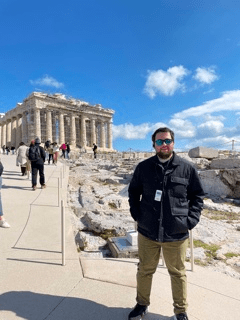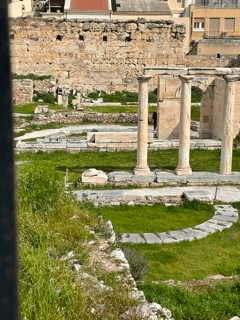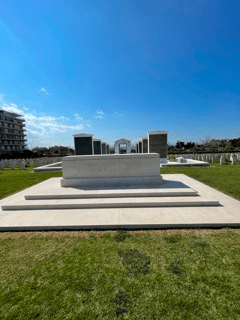Greece: A Nation Defined by its History Both in the Ancient and Contemporary Past
Colin Nashelsky

Despite seeing the planned trip to Athens even before the semester began, nothing could quite prepare me for the experience of actually being there. A city filled to the brim with culture, incredible food, and of course, history. Having lived in America my whole life, it was incredibly interesting as someone with a great interest in history to walk around and explore a city that keeps its history for all to see. Not only does this help bring tourists from around the world to want to visit these sites, but I began to realize that they also served as reminders to the people who lived there of who they were and how they have changed.

One of the parts of Athens that intrigued me was the big historical monuments such as the Parthenon along with the smaller historical sites preserved throughout the city. One of these was an ancient marketplace that had been quite popular during the time for merchants of all sorts of trades to gather and do business. While not as renowned as the Parthenon, I still found a place like this that has been preserved and kept in its natural state to be a fascinating look at how history is remembered there. It would be easy to simply remove the ruins of the old market and perhaps replace it with a new one but to the people of Athens; the history and memory of the old market are more valuable than anything that could come from its removal. This is not to say places such as the Parthenon were not also historical feats of wonder and preservation but something about a marketplace that many would find to not be as impressive still being preserved for all to see to this day is something that greatly fascinates me.

However, what caught my attention the most and really made me think about the power of keeping history in our minds was not found at any of the ancient historical sites, but one of Greece’s contemporary ones instead. Upon visiting the National Memorial at the Phaleron Cemetery, I was amazed at how I had never known of the very polarized and bloody civil war that occurred in the country following the Second World War. There were graves for soldiers who fought and died along with unnamed graves for those they were unable to identify. This Cemetery was there in order to remind the people of Greece of its history from the last few decades and what it took for them to get to where they are now. It was here where I realized that I had only considered Greek history in relation to ancient times and little beyond that. I know quite a bit about the war against Persia and the legendary Spartan army but when it comes to 19th and 20th-century Greece I know very little in comparison.

It made me realize that I only looked at and knew what is mainly considered to be the interesting part of Greek history, the ancient cities and battles, and not the other less popular parts of history. I started to consider if there were other areas of history that I did this for and eventually I realized I needed to reevaluate how I have looked at history overall. If I plan on making a future out of studying history, I need to be able to look at every part of a nation’s history, not just the parts that are cool and well known. For me, this trip to Greece was not only a place of amazing culture, food, and sights to see but also a lesson in history and what it truly means to look at history and remember it.





